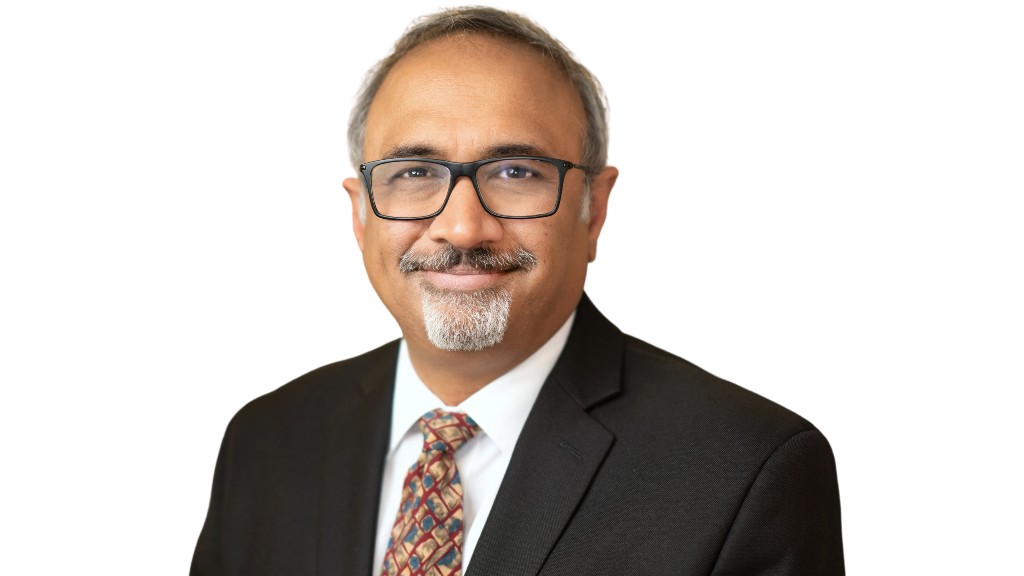Sanjay Sarma: "The future belongs to online universities that strike deals with companies for internships and apprenticeships"

Sanjay Sarma, Professor of Mechanical Engineering and Vice President for Open Learning at the Massachusetts Institute of Technology (MIT), was the main speaker at the event to mark the start of the UOC's 2020/21 academic year, the 25th in the University's history. His inaugural lecture, titled What Is the Future of Education?, reflected on the global challenges facing education. The event was presided by the UOC's President, Josep A. Planell, with contributions from Pere Vallès, chair of the FUOC's Board of Trustees, and Ramon Tremosa, the Government of Catalonia's Minister for Business and Knowledge.
Sarma began his address by reviewing the history of the education system since the first religious universities appeared in Asia more than 2,500 years ago, pointing out that "if you look at these monasteries and you look at our universities today, there is still a similarity". He then talked about a feature prevalent in education systems in more recent times, testing, noting how it took off with the Industrial Revolution some two hundred years ago. "Just as you test a part, you test a student," he said, "Parts need to be interchangeable, exchangeable, the same part has to fit into another car, [...] so we also standardize the students completely."
Sarma highlighted the rapidly changing nature of the world today, in which the adoption rate of new technologies has continued to accelerate. The implication of this is that "the half-life of a lot of our jobs is really plummeting. In other words, your skills become out of date very quickly," Sarma said, before highlighting how important it is for adults to take charge individually of their lifelong learning.
The pandemic
He also mentioned the radical shifts brought about by the global pandemic, transforming how we learn, work and live. He believes that this will not be the only crisis of this kind that our society will have to face. We need to get used to a new normality in which we move away from the idea of students as parts of a production chain and instead give people knowledge and agency for their future success.
"The lecture format is resilient [...], nothing has changed in 700 years," Sarma said. This worries him, he continued, basically because it is grounded on the assumption that "the professor has a pen and the student's brain is a sheet of paper. And that's a very unfortunate assumption, [...] because the human brain should really be treated as an organism that grows."
The future of education
And with all that we know today about how the brain works, what will the future of education be, in Sarma's opinion? "These lectures that we do in person, they have to go online," he argued, "and all these other tricks, all the cognitive tricks, you can actually apply online". He added: "And this is where UOC comes in; you were designed from the beginning to go this route. You were visionary".
"I hope that [...] the traditional universities will become places of action, creation and impact," Sarma wished in the closing minutes of his address, before ending with a prophecy: "The future belongs to online universities that strike deals with companies for internships and apprenticeships".
The start of commemorations for 25 years of the UOC
Presiding over the inaugural lecture was the UOC's President, Josep A. Planell, who highlighted how the University's creation in 1995 was an "act of disruption", and sustained that that this "far-out creation" is going stronger than ever. "With the fourth industrial revolution now under way, we want to be fully involved in this digital transformation of our future: in the shoes of the people studying, of those training themselves, of those renewing their skills, and of those shaping tomorrow's world," Planell said.
The event was also attended by Pere Vallès, chair of the FUOC's Board of Trustees, who presented a video report to commemorate the University's 25 years. He highlighted the vocation for public service with which the UOC was created and its commitment to developing a distanceless model that would lower the entry barriers to higher education, foster lifelong learning and meet the needs of the society to which we belong.
The inaugural event's closing address was given by Ramon Tremosa, the Catalan Minister for Business and Knowledge and head of university and research policy in Catalonia. He applauded the University's continuous growth and the success achieved by its model, evidenced by the UOC's presence in the leading international rankings. He also drew attention to the fact that the exceptional situation that has taken up a large part of this year will have affected the UOC's university community less than most, "as, for the last quarter century, the UOC has been pioneering e-learning as a driver for social transformation."
Press contact
-
Editorial department
